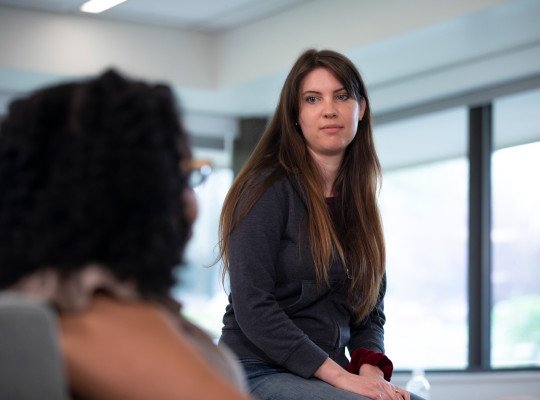Aftercare
To create the most effective aftercare plan as clients transition out of HopeWay, the client's treatment team will begin planning for discharge from the first day the client enters a program.
Creating a Treatment Plan
Clients are involved in the discharge planning process throughout treatment. As they create their treatment plan with their primary therapist, they come up with treatment goals that not only impact their day-to-day recovery, but also their long-term progress.
HopeWay Aftercare Coordinators
Primary responsibility for developing discharge plans lies with our Aftercare Coordinators who work with clients one-on-one to develop a comprehensive and individualized plan. Our Aftercare Coordinators help clients identify what support they will need once they leave HopeWay. Aftercare plans may also link clients with a peer support service, with local support groups, and/or provide other helpful resources that support continued recovery and growth. Depending on the client’s circumstances, discharge planning may include finding a place to live, completing applications for school or new employment, and/or developing skills to successfully live independently.

Mental Health Support Group
Wednesdays 5:30 - 6:45pm
 Led by Sheri Tiziani, MS, LCMHCS
Led by Sheri Tiziani, MS, LCMHCS
The Mental Health Support group is an opportunity for individuals to receive additional support on their mental health journey. This group allows participants to process generally and receive and provide support, as well as learn and review psychoeducational topics related to relapse prevention, self-awareness, Cognitive Behavioral Therapy and Dialectical Behavior Therapy, healthy relationships, life adjustments, parenting skills/support, stress management, mood disorders, anxiety, and self-esteem. Self-reflection is encouraged as a way to provide insight into patterns contributing to both mental health struggles and wellness.
To inquire, please call HopeWay Psychiatry & Associates at (980) 859-0990. This group meets at 1717 Sharon Road West, Charlotte, NC 28210.
What is Relapse Prevention?
Relapse prevention is an essential ingredient in any comprehensive treatment program. At HopeWay, these groups focus on several key concepts:
-
Helping clients understand the process of recovery from both a mental illness and/or substance abuse perspective
-
Helping clients understand what “triggers” and “early warning signs” are, to then helping each client identify their own individual triggers and warning signs
-
Determining what helps when warning signs appear
-
Learning what to do during high risk times, dates, or events
-
Determining who they will ask for help
-
Identifying emergency contacts
Each client works in these groups to develop a personalized relapse prevention plan that can be used as a resource after leaving HopeWay.
If you are in crisis, please call the Suicide Prevention Lifeline
